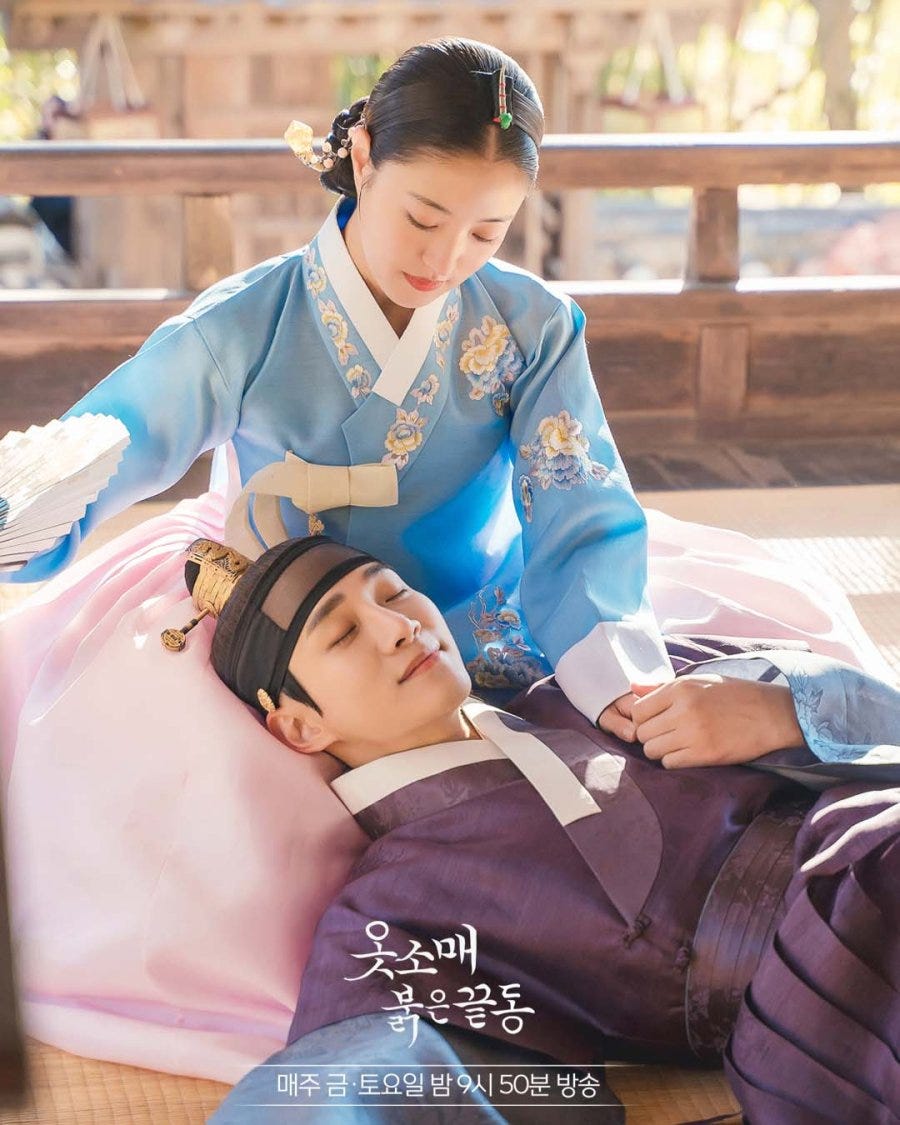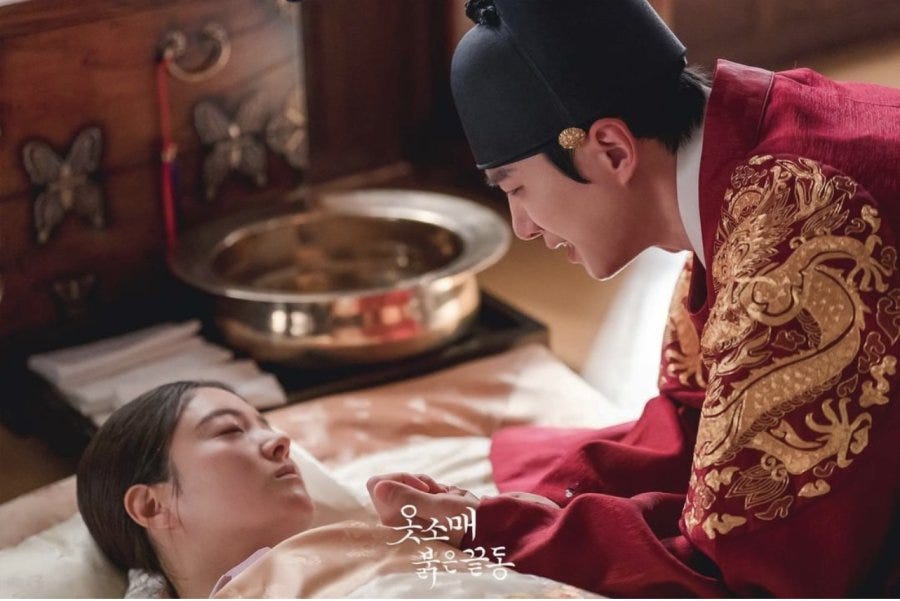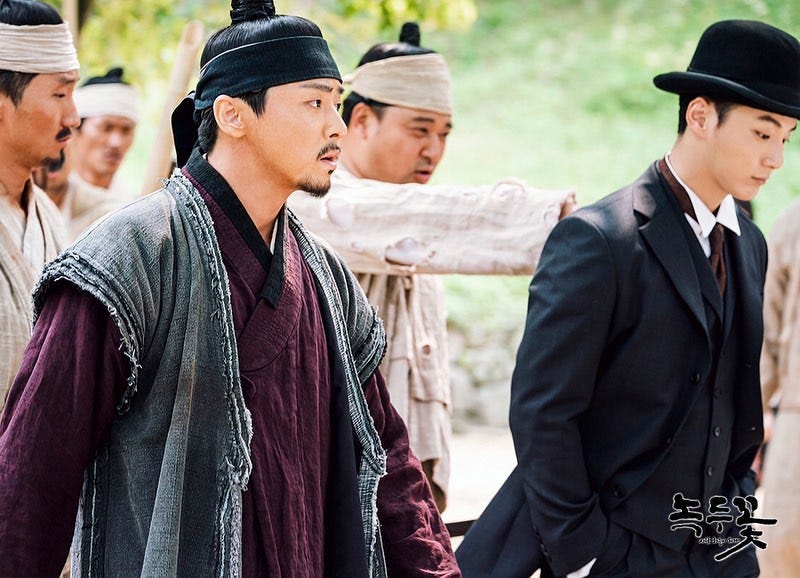The Red Sleeve (2021) Final comments
If you’re a big fan of MBC’s most highly rated 2021 drama, you might not like what I have to say here so this is my attempt at a trigger warning. But if you’ve been following my comments on the drama throughout its run, this will scarcely come as any great surprise. I will begin with the compliments as is customary here and then get out the brickbats when I’ve soften the blow… as it were.
I had my expectations as everyone does but nothing particularly high because there’s a reason why I haven’t made the effort in hunting down many sageuks in recent years. The lingering irony coming from this experience is that the aspects of the drama that I had the highest hopes for turned out to be mildly disappointing and the aspects that I didn’t have really high expectations for, turned out to be rather better.
Lee Jun-ho’s terrific performance as the crown prince turned king aside, the writing of Yi San or King Jeongjo of Joseon is wonderfully balanced and poignantly nuanced. Here is a lonely young man who wanted to live up to and achieve the role he was born to play in public but in private, at his core, he craves for genuine family ties. He longs for genuine affection due to the dysfunctional dynamics that he witnessed as a child. The script and the actor paint a sympathetic portrait of a young reformist monarch who despite having enough on his political plate to contend with was adamantly in search of true love. His backstory is clear enough that his subsequent actions make sense. A decent stab was also made of his persistence towards Sung Deok-im and for the most part, it worked. Did he have trouble taking no for an answer? The question is irrelevant because historically the man did persist which is why his affection for Sung Deok-im has become somewhat legendary. It’s in the history books for speculation. Moreover, Yi San is the king of Joseon which the show is at pains to remind us and he doesn’t have to take no for an answer as far as bedding court ladies are concerned.
The political landscape of The Red Sleeve turns out to be a fairly simplistic one despite the parade of men in beards that one is privy to. There’s very little genuine opposition to Yi San’s ascension and rule save that of disgruntled court ladies who delude themselves that they are a force to be reckoned with. While their presence in the narrative require a suspension of disbelief which I’m willing to do for entertainment’s sake, it seems to me on hindsight that they function more of a propaganda organ for the storytelling rather than believable historical players. The arc more or less fizzles out into non-descript irrelevance. Instead they serve as a kind of proto-feminist megaphone that men or the patriarchy more generally are the enemy. It’s a message that I’m sure resonates with modern audiences far more than it would have say… two or three hundred years ago with court ladies going about their business trying conscientiously not to offend their royal masters.
I don’t think that anyone with any knowledge of history would dispute the fact that the life of women was hard in 18th century Joseon no matter her station in life. A court lady’s life would be no better than that of a peasant in some regard despite enjoying certain perks and being surrounded by accoutrements not available to the general public outside the palace walls. That said, I have a hard time imagining a court lady using her desire for independence as rationale for turning a king down although I can easily imagine a court lady bedding a lad who is not the king. After a time it becomes apparent that Drama Deok-im isn’t a real person. Nor is she even a character. She’s the mouthpiece of a twenty-first century sensibility inserted into an 18th century palace story without the complexity of needing a time skip device that has plagued many a fusion sageuk. She is largely written for contemporary consumption inserted into the narrative as a lens to understand the world from a postmodern world. Episode 17 is somewhat proof of that.
Episode 17 was in essence an appendix in an essay and behaved like an afterthought. No doubt the production team found it necessary to tack it on because they realised that they had done a rather less than stellar job of making Deok-im’s demurs about the king articulated from Episodes 1-16 consistent. The episode in question was necessarily manipulative and selective to be in concert with the thesis that Deok-im might have been right to maintain a posture of independence and to resist Yi San’s overtures of love and security for as long as she did. It’s a perpetual elephant in the room for her and for him that things could have, might have been “better” if she had been allowed to remain unwedded because it could have averted the tragedies that followed her rise in status. Episode 17 on the surface at least, appears to support the thesis she was right to second guess, to resist the love of the king and that he might (although that’s sneakily ambiguous) have been “wrong” in putting undue pressure on her.
It’s always been somewhat obvious in the narrative that Deok-im has feelings for Yi San who is no deluded fellow. Like the rest of us, he senses it too. He’s in a Catch-22 situation. If he tries too hard, he’s an irresponsible stalker. If he doesn’t make the effort, his devotion will inevitably be called into question. The lad is trying his darndest because he’s trying to prove his sincerity. He even sends the lady out of the palace to give her freedom but she’s recalled to the palace because his mother thinks he needs to have a bit of happiness in his life. It’s confusing and the show seems to revel in it so that they can do the Episode 17 thing. So Deok-im continues to play the agency card.
My problem is that I don’t believe her. Even after Episode 16 or 17 for that matter. I don’t think the writer is very much convinced either despite the seeming pile-up of tragedies that befall the newly conferred royal consort towards the end of her life. The fact is character is destiny and her character is such that she can never opt for safety and a carefree existence. Time and time again, she’s jumped into things feet first because she thinks she can. Even if she never succumbs to the charms of the king, she will continue to embroil herself in some kind of palace brouhaha and then rely on his goodwill to get her out of it. That’s exactly the point that Hong Deok-ro was making before his untimely exit. The truth is she wants access to His Majesty’s favour but is loath to commit. Deok-im appears drawn to high risk ventures and in all likelihood it comes from that same impulse to be independent. She can’t stay away from volatile situations because she is someone who has to insert herself in events she knows she has the possibility of turning around. Everyone knows she’s a risk taker. She certainly doesn’t hide it and it’s why I imagine Yi San doesn’t take no as the final answer. There might be a power imbalance (which is obvious given the situation) but one can’t say that this Yi San (at least) isn’t willing to plead pathetically with the woman he purportedly loves. Their entire dialogue of course presupposes that they both understand this very foreign idea of “personal liberty”.
As if to prove Deok-im’s point, Episode 17 dives right into the loss of the young crown prince out of the blocks. But what happened to the 3 years prior? It can’t have been all tears surely. However, that’s not the point. The whole point of the episode is to sledgehammer home the tragic lot of women who don’t have a lot of choices available to them. Neither does the young king as a matter of fact who is already married to a woman for political purposes, progeny but not for love. It’s rather convenient that she’s never seen but only referred to in passing.
If there’s one thing I appreciate about our ancestors, it’s that they understood far better than we do the reality of suffering and agency. They understood the tragic vision of life. We, however, have become so accustomed to access to advances in medical science especially that we seem to have forgotten that it was commonplace for women not only to lose children before they reach adulthood but die as a result of childbirth regardless of her status. The fact that fairy tales are replete with villainous or indifferent stepmothers is suggestive. It isn’t that our ancestors didn’t grieve over the loved ones as we do but they didn’t see happiness as the endgame. They didn’t live their lives avoiding hardship reflexively. That wasn’t a priority. Even a half-decent monarch knew that he/she couldn’t do whatever he wanted without consequences politically. Any individual of any status labouring under any kind of system (whether it be feudalism or a democracy) would be constrained in some fashion by laws, traditions, customs and beliefs. To be fair, the show acknowledges this reality. This ironically however makes the Deok-im character feel much more anachronistic when she puts forward her claim to agency. While I have nothing but praise for Lee Se-young’s performance in this, the Deok-im as presented here is philosophically jarring. The result is I find myself unable to invest in the Yi San-Deok-im dynamic to the extent that I am required to. As the show makes a fanfare of their “romance”, I imagine I am invited to buy into their relationship as it stands. It is an important part of the show considering how much weight it’s given so I can only think that I’m not the target audience here because I remain unconvinced. It feels to me the show is arguing for a glass half empty scenario while everything that I’m seeing is a glass that’s half full.
I am very partial to historical dramas because they’re not shy from presenting a tragic vision of life. I admire the ancients in so far that they built strength of character from undergoing the harshness of reality. One of the reasons why I loved the deeply flawed Moon Lovers was because the showrunners were able to highlight all of that with an unholy passion. There was a ruthless streak running right through the storyline that is a reminder that the ancient world was a dangerous place for personal liberty. In fact, liberty was a relatively foreign… alien… idea discussed only by dead white men in another part of the word in the early modern period.
As far as watchability is concerned, The Red Sleeve checks that box because the acting is indisputably top-notch. I am especially entranced by Jang Hee-jin who plays the shrewd and multifaceted Queen Kim Jung-soon later the Queen Dowager. I regret to say I didn’t remember her from Flower of Evil but here, she steals just about every scene she’s in and gives only memorable performances in that role. This young queen is clearly a woman of her time, knowing fully how the game is played in that world. She’s neither friend or villain although she’s capable of both. Special mention should also be made of Lee Deok-hwa who plays the elderly King Yeongjo with good-humour, depth and dignity. Yeongjo is undoubtedly a flawed beast but Lee Deok-hwa grandfatherly manner takes him out of cookie cutter territory.
As a whole I find the script ordinary. Elsewhere I’ve slapped on the label of fan fiction and I hold to it. The story itself is really nothing special, at least nothing that’s not done before and done better. I’m of the view that if you remove all the historical trappings, it would easily work as a romance melodrama in a corporate setting. Even the political maneuvering (what little of it there is) stays at a very elementary level. As someone who has watched some serious sageuks and Chinese historical dramas in the past, the plot is really just so-so. The production values are high and it’s very pretty to look at. While it was high in entertainment value because of the actors, I wasn’t wowed by it. All in all I enjoyed the first half much more than the second half.
The last truly great sageuk that I’ve seen in recent years is Nokdu Flower. It isn’t everybody’s cup of tea but it certainly has breadth, depth and incredible characters. If you’re in the mood for a haunting, bittersweet, beautifully tragic story that lives up to the historical tag, this is the one to go for. The bleakness may be overpowering for some but it’s a masterpiece in every sense of the word.






